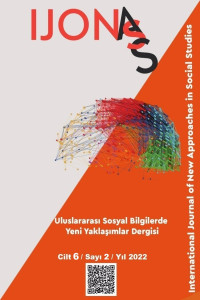Öz
Platon, iyi bir devlet yönetimini (“en iyi”/ideal devlet) ancak iyi bir toplum düzeni (“en iyi”/ideal toplum) ile, iyi bir toplum düzenini de ancak iyi bir eğitim (“en iyi”/ideal eğitim) ile mümkün görmüştür: “Varlığın en ışıklı yönüne, -iyi- dediğimiz yöne çevrilebilmesi gerekir, değil mi? Evet, eğitim ruhun bu gücünü -iyiden- yana çevirme ve bunun için en kolay, en şaşmaz yolu bulma sanatıdır. Eğitim onu yalnız iyi yana yöneltir. İnsanları en yüksek saydığımız şeyin bilgisine doğru yöneltmek, onları karanlıklardan ışığa çıkarmak, devletin kurucuları olan bizlere düşer” (s.236-237). Eğitim, idea temelli, dolayısıyla “ideolojik bir aygıt” (Althusser, 2010) olduğu için devlet ile toplum arasında bir nevi köprü görevi görür (Wiborg, 2000). Platon’un Devlet’ini, eğitim politikaları açısından değerlendirmenin önemi budur.
Anahtar Kelimeler
Kaynakça
- Althusser L (2010). İdeoloji ve Devletin İdeolojik Aygıtları. Çev. A. Tümertekin, İstanbul: İthaki Yayınları.
- Boudon, R (1986). L’idéologie. L’origine des Idées Reçues.Paris : Librairie Artheme Fayard.
- Bourdieu, P ve Passeron, J-C (1970). La Reproduction. Eléments pour une théorie du système d’enseignement. Paris : Les Editions de Minuit.
- Bourdieu, P ve Passeron, J-C (1964). Les Héritiers.Les Etudiants et la Culture. Paris : Les Editions de Minuit.
- Charadeau, P ve Maingueneau, D (2002). Dictionnaire d’analyse du Discours.Paris: Le Seuil.
- Dürüşken, Ç (1995). Antik Çağda Doğan Bir Eğitim Sistemi. Rhetorica. Roma’da Rhetorica Eğitimi. İstanbul: Arkeoloji ve Sanat.
- Eren, E (2020). Yeni Tip Koronavirüs'ün Türk eğitim politikaları uygulamalarına etkisi: Milli Eğitim Bakanlğının ve Yükseköğretim Kurulunun yeni düzenlemeleri. Yükseköğretim Dergisi, 10(2), 153-162.
- Foucault, M (2004). The Birth of Biopolitics.New York: Macmillan.
- Russell, B (2011). Histoire de la philosophie occidentale. En relation avec les évènements politiques et sociaux de l’Antiquité jusqu’à nos jours.Trad. H. Kern. Paris : Les Belles Lettres.
- Wiborg S (2000). Political and Cultural Nationalism in Education. The Ideas of Rousseau and Herder Concerning National Education. Comparative Education Nigel Grant Festschrift, 36(22), 235-243.
Öz
According to Plato, a good state administration (“best”/ideal state) can only be combined with a good society (“best”/ideal society), and a good society can only be achieved with a good education (“best”/ideal education). He saw it as possible: “It must be able to be turned towards the most luminous aspect of existence, the direction we call -good-, right? Yes, education is the art of turning this power of the soul - for the good - and finding the easiest and most unfailing way for it. Education only leads him to the good side. It is up to us, the founders of the state, to lead people towards the knowledge of what we regard as the highest, to bring them out of the darkness into the light” (p.236-237). Since education is an idea-based and therefore an “ideological device” (Althusser, 2010), it acts as a kind of bridge between the state and society (Wiborg, 2000). This is the importance of analyzing Plato's Republic in terms of education policies.
Anahtar Kelimeler
Kaynakça
- Althusser L (2010). İdeoloji ve Devletin İdeolojik Aygıtları. Çev. A. Tümertekin, İstanbul: İthaki Yayınları.
- Boudon, R (1986). L’idéologie. L’origine des Idées Reçues.Paris : Librairie Artheme Fayard.
- Bourdieu, P ve Passeron, J-C (1970). La Reproduction. Eléments pour une théorie du système d’enseignement. Paris : Les Editions de Minuit.
- Bourdieu, P ve Passeron, J-C (1964). Les Héritiers.Les Etudiants et la Culture. Paris : Les Editions de Minuit.
- Charadeau, P ve Maingueneau, D (2002). Dictionnaire d’analyse du Discours.Paris: Le Seuil.
- Dürüşken, Ç (1995). Antik Çağda Doğan Bir Eğitim Sistemi. Rhetorica. Roma’da Rhetorica Eğitimi. İstanbul: Arkeoloji ve Sanat.
- Eren, E (2020). Yeni Tip Koronavirüs'ün Türk eğitim politikaları uygulamalarına etkisi: Milli Eğitim Bakanlğının ve Yükseköğretim Kurulunun yeni düzenlemeleri. Yükseköğretim Dergisi, 10(2), 153-162.
- Foucault, M (2004). The Birth of Biopolitics.New York: Macmillan.
- Russell, B (2011). Histoire de la philosophie occidentale. En relation avec les évènements politiques et sociaux de l’Antiquité jusqu’à nos jours.Trad. H. Kern. Paris : Les Belles Lettres.
- Wiborg S (2000). Political and Cultural Nationalism in Education. The Ideas of Rousseau and Herder Concerning National Education. Comparative Education Nigel Grant Festschrift, 36(22), 235-243.
Ayrıntılar
| Birincil Dil | Türkçe |
|---|---|
| Konular | Eğitim Üzerine Çalışmalar |
| Bölüm | Kitap İnceleme |
| Yazarlar | |
| Yayımlanma Tarihi | 30 Aralık 2022 |
| Yayımlandığı Sayı | Yıl 2022 Cilt: 6 Sayı: 2 |


